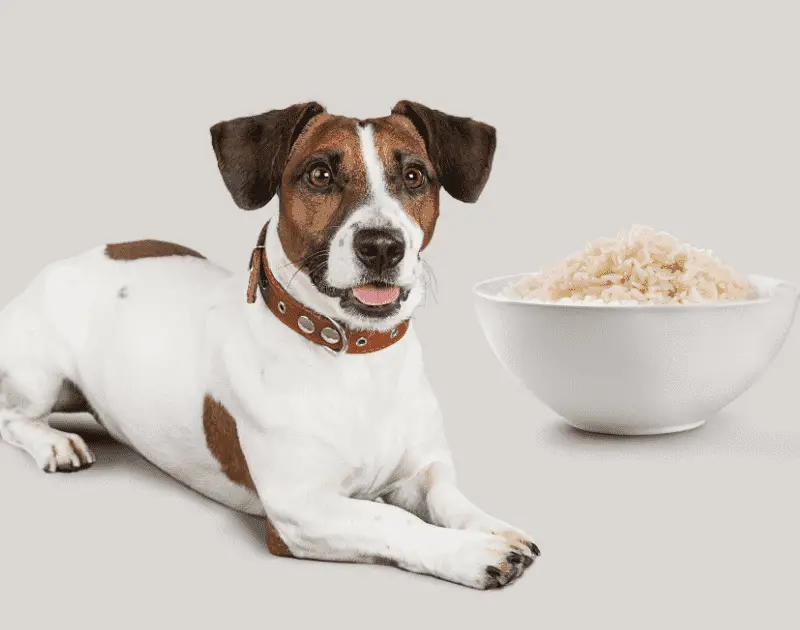
Can Dogs Eat Jasmine Rice?
Yes, dogs can eat jasmine rice in moderation for the following reasons:
- As a dog owner, chances are you’ve given thought to expanding your dog’s diet and making it health more robust.
- The types and quality of nutrients contained in jasmine rice are simply too beneficial to be ignored.
- Jasmine rice is the remedy for a substantial number of canine distresses, especially stomach distresses like diarrhea.
- Dogs like humans will grow and develop better when exposed to highly nutritious food like Jasmine rice.
- Jasmine rice will help dogs maintain a low level of cholesterol and, as a result, stay above a host of adverse health conditions.
Here are 6 things you need to know about dogs and Jasmine rice:
The difference between Jasmine Rice and regular rice
You probably have seen rice being served as part of a dog’s diet in many cases and might be wondering why Jasmine rice requires any special consideration. The reason is that Jasmine rice, even with its usually white color, is quite different from the usual kind of rice.
Firstly, Jasmine rice is always long-grained, while white rice could be long, medium, or short-grained. Jasmine rice (also known as the Thai-fragrant rice) has a striking and pleasant aroma, making it stand out from the regular white rice. It can appear in other colors like purple, brown, red, and even black.
Jasmine Rice Nutrition Facts
Your dog’s health is closely tied to the quality of food made available to it. Jasmine rice is one of such foods that your dog requires for proper growth and development. Here is why:
A half-cup, or 90g, or 2.25 oz serving of the brown variety of Jasmine rice will produce the following nutritional results:
Calories: 320
Fat: 2 grams
Cholesterol: 0 grams
Sodium: 0 grams
Carbohydrates: 35 grams
Fibre: 4 grams
Sugar: 0 grams
Protein: 6 grams
Other nutrients such as Phosphorus, Magnesium, Manganese, Selenium, Vitamin B1, and vitamin B6 will also be derived from a Jasmine rice diet. What do these mean for your dog?
The Health Benefits of Jasmine Rice for Dogs
There are a lot of health benefits to be enjoyed by your dog from Jasmine rice. One of them is the high-calorie content that it boasts of. Just a quarter of a cup of Jasmine rice will provide 160 calories, and half a cup, 320 calories for your dog.
With this substantial amount of calories and carbohydrates, your dog will be provided with all the energy that it needs in a day. The fiber and vitamin content of Jasmine rice is known to boost the nervous system of canines. The fiber content also helps to free up the digestive tract and ensure that digestion goes as smoothly as possible.
Vitamin Bs provide a wide range of benefits for your dogs. For example, Vitamin B6 is responsible for glucose generation, the control of the body’s hormones, immune response, and ensuring the proper functioning of the red blood cells.
Your dog’s diet is inadequate without phosphorus. A major player in the health of their bones, phosphorus helps proper bone development in growing dogs and maintains bone strength in adults. Too much phosphorus can result in kidney damage, but thanks to Jasmine rice, your dog will get a safe amount of phosphorus in its food.
Another nutrient that plays an important role in the well-being of canines is magnesium. Jasmine rice gives you nothing to worry about when it comes to an adequate supply of magnesium. Magnesium in your dog’s diet promotes the proper functioning of hormones, the nervous system and enhances metabolic functions.
When magnesium is not present in the proper quantity in your dog’s diet, many things can go wrong. Some of the effects of improper magnesium levels include depression, lethargy, muscle pain and weakness, nutrient deficiency, and endocrine diseases. Jasmine rice provides an adequate supply of magnesium to forestall these effects.
Manganese Role
On its part, the manganese content of jasmine rice will ensure that you won’t have to worry about the toxicity that comes from both inadequate and excessive nutrient content. Manganese aids the digestion and conversion of food, the proper formation of the skeletal structure, and the proper functioning of the kidney and liver.
Selenium is a crucial requirement for dogs; though a trace element (required in small quantity), it performs too crucial roles to be overlooked. An adequate amount of Selenium in your dog’s diet will ensure that it gets the proper antioxidant protection to safeguard against diseases and ensure proper hormone function.
Is your dog dealing with diabetes? Jasmine rice has a low glycemic index of between 68 and 80. It usually falls below the 70 mark, which makes it renowned for its efficacy in curbing sharp rises in blood sugar.
One of the most talked-about benefits of feeding dogs with jasmine rice is that it helps prune their cholesterol levels, which ensures that they remain healthy and less vulnerable to a host of diseases associated with the high cholesterol content.
Jasmine Rice for Dogs: The Good and The Bad
Even after reading about the wonders jasmine rice can do for your dog, you can run into other dog owners with not-so-encouraging stories about it. The reason isn’t far-fetched.
Just like every other type of food, Jasmine rice can benefit or hamper the health of your dog, depending on how it is used. Jasmine rice is best served to your dog in moderation. Otherwise, it may become a hindrance to their growth and development. The more appropriate answer to the question, if dogs can eat Jasmine rice, is yes, in moderation.
The major reason moderation is crucial is that the metabolism of dogs isn’t nearly as complex and efficient as that of humans. While the human digestive system can handle high intakes of Jasmine rice, dogs will find it quite problematic.
Moderation could be an ambiguous term when you think of it. The question remains, what is moderate and what isn’t?
Moderation could mean many things based on the age, size, and breed of your dog. For instance, what could be moderate for big-sized dogs could be too much for smaller-sized dogs.
The safest way to observe moderation is to not serve Jasmine rice too frequently. You will also do well to not make jasmine rice the major constituent of the dog’s meal every time it is served. Try making it the secondary course at least half of the time that it is served.
Is Jasmine Rice Bad for Dogs?
Some jasmine rice could fall into the high glycemic index category of 70 and above. In this case, it could pose a risk of diabetes to your dogs. However, this can also be put in check by feeding your dogs with jasmine rice in moderation.
The starchy part of Jasmine rice, responsible for its high carbohydrate content, has also been discovered to pose some issues to dogs. When your dogs feed on too much starch from jasmine rice, they could develop stomach upset. You could contain this problem by draining the starch away from the rice before serving it to the dogs.
There have been records of dogs being allergic to jasmine rice. This can easily be noticed after a serving. Take note to observe any unusual behavior or condition in your dogs like hair loss, itching, or restlessness, which are some common dog allergic reactions.
How to Treat Diarrhea in Dogs with Rice Water
Many patients with minor issues like diarrhea can be treated safely and effectively at home. Diarrhea and indigestion are common issues for canines. Pet owners can attest to the fact that canines eat a lot of things they shouldn’t. When they do, their gastrointestinal system acts up through vomiting or diarrhea in response to what they shouldn’t have had.
This tends to vary as it depends on the diet, age, and temperament of your pet. If it’s acute, it’s a sure confirmation that your pet reacts to something it ate. If it’s chronic, it’s a serious issue, and your vet should be contacted immediately.
Either way, you should contact your vet while you try to relieve them and make things easier.
- Watch out for dehydration: They will likely be dehydrated as they lose body fluids through vomiting and diarrhea.
- Withhold food for 12-14 hours while providing adequate water and rice water to drink. Skip this procedure for dogs with chronic illness, dogs under one year, and senior dogs. They can develop low blood glucose if they don’t eat.
- Slowly introduce them to solid food. Feed your bland dog diets like plain cooked rice and unseasoned boneless chicken.
- Avoid physical activity, long runs, and strenuous activities.
Ensure you monitor your canine and take note of important information that will help your vet out. Notes like:
- Keep a count of the number of your dog’s bowel movements.
- What the poop looks like, is there blood in it?
- Does your dog have fever, pain, vomiting?
- Has your dog recently had something toxic?
How will you know if your dog with diarrhea must be checked by a vet:
- Black stool with extensive quantities of deep red blood is the first noticeable warning sign
- The dog is in a bad mood
- General inactivity
- Pain in the abdominal place, moaning, breathing fast, the dog doesn’t want to touch his belly
- Dog vomits continuously
- Diarrhea’s duration is more than 48 hours
The immediate care for mild dog diarrhea involves a simple home remedy we will discuss in a bit.
Rice Water
White rice contains active probiotic contents that help the body reestablish itself, speeding the recovery process. Jasmine rice is the best rice quality you can use for rice water. Rice water is the soft liquid obtained when you boil white rice.
Brown rice isn’t appropriate for that because of the high amount of fiber.
Preparation:
The procedure is simple:
Boil 220 grams of rice in almost 1 liter of water for 15-25 minutes and take it off when you see that the water has almost turned into a cream.
Drain the rice and keep the cream until it cools down.
You can serve it plain or with some chicken flavor powder or whatever your dog likes the most.
Mix some probiotics (the best is to get them from your veterinarian) into the rice water so they can help your dog’s bowel health.
Related Articles About Dogs’ Diet:
Can Dogs Eat Spaghetti Squash?
Can Dogs Eat Olives? Are Olives Bad For Dogs?
Can Dogs Eat Jalapenos? Are Jalapenos Bad For Dogs?
How to Feed Jasmine Rice to Dogs – How to Cook/Prepare It
It is quite common for most dog owners to feed their dogs food in the same way they consume it. The long-grain variety of fragrant rice, Jasmine rice, is not an exception.
Jasmine rice is like other types of long grain rice. The only difference is that it gets softer and stickier when cooked. Cooking Jasmine rice for dogs is not any different from how you would normally cook some for yourself.
However, this should be fed in moderation because, like other kinds of long rice, Jasmine rice has similar amounts of fiber, calories, and of course, carbs. Too many carbs can make your dog fat.
Simply boil it in water. Do not add seasonings or spices. This is because the spices can be toxic for dogs and have the potential of causing stomach problems such as pain, diarrhea, and gas. Just keep it simple and plain; your dog will not know the difference.
As a piece of advice, before introducing any new food to your dog’s diet, be sure to consult your veterinarian to ensure the food is safe for your dog.
Frequently Asked Questions
Can Dogs Have Basmati or Jasmine Rice?
Yes, they can. Basmati rice is long-grain rice that is grown in the Himalayas, India, and parts of Pakistan. It possesses a prominent aroma, which is why it was named Basmati, full of aroma in Hindi.
Dogs can eat Basmati and Jasmine rice (bar the case of allergies) because they provide a substantial number of health benefits. Their high carbohydrate content is required by dogs for the right supply of energy. They are also effective and recommended for dogs with stomach upset or diarrhea.
Basmati rice, just like Jasmine rice, is high in starchy carbohydrates, which could pose a risk of diabetes for dogs. However, their nutritional benefits far outweigh any risks that they pose as long as they are fed to dogs in reasonable amounts.
Is Jasmine Rice Ok for Dogs?
Yes. Jasmine rice is fed to dogs by a large and growing number of dog owners and dog care specialists who have discovered how useful it is to a dog’s diet.
What Type of Rice Is Safe for Dogs?
Dogs can eat every type of rice, including white rice, which is easy to digest and is a good energy source. However, some types of rice (especially white rice) contain way more starchy carbohydrates than do some others, which contributes to diabetes. The safe thing to do is lean more towards brown rice, which has higher protein and lower carbohydrates.
Can Dogs Eat Brown Rice?
Yes. Dogs can eat brown rice. As a matter of fact, brown rice is the most preferred type of rice for feeding dogs due to its reduced risk of causing or contributing to diabetes.
Can Dogs Be Allergic to Jasmine Rice?
Yes. Like several other kinds of dog food, Jasmine rice has been found, though on very rare occasions, to cause allergic reactions in dogs. If you notice any signs of allergy like itching, loss of hair, and restlessness after feeding your dog with Jasmine rice, it’s a sign that you shouldn’t proceed with it.
Can Dogs Eat Wild Rice?
Yes, they can. Wild rice contains more protein than regular rice and many other grains. Wild rice is not exactly a rich protein source. Still, it is considered a complete protein source because it contains all the nine essential proteins.
Dogs are carnivorous, which means that they do best on a diet that provides many animal proteins. On this note, it is safe to say that dogs can indeed eat wild rice.
Wild rice also contains fiber, which is an excellent digestive aid.
Antioxidants are also present in wild rice. They help to combat diseases caused by oxidative stress and remove harmful toxins from your dog’s system.
Also, the nutty taste and crunchy texture of wild rice are most likely going to appeal to your dog’s taste buds.
Are Jasmine Rice and White Rice the Same?
No. It is noteworthy to state that Jasmine rice is of different types, among which there is the white Jasmine rice. White Jasmine rice falls under the category of white rice.
Both long-grain white rice and white Jasmine rice contain a similar amount of nutrients, calories, carbs, protein, and fiber.
The processing of white rice (including white Jasmine rice) strips them of fiber and many nutrients. Brown Jasmine rice, another type of Jasmine rice, is less processed than white rice. For this, fiber and many nutrients are usually available in the final product.
While white rice has short, medium, and long grains, Jasmine rice has only long grains. In terms of color, white rice is always white, but Jasmine rice comes in various colors. In regards to smell, Jasmine rice has a pleasant pop-corn-like smell. Most types of white rice lack a distinct smell.
So, apart from white Jasmine rice, which shares some similarities with long-grain white rice, Jasmine rice is not the same as white rice.
How Much Rice Can I Give My Dog?
When feeding your dog with rice, it is advisable to give it in small portions because large servings of rice are not good for your pet.
Your dog can eat cooked rice every day. However, there should be a balance of the nutrients your dog needs, such as protein, calcium, essential fatty acid, fat from meat and oil, and of course, carbohydrates. Rice is majorly where the carbohydrates come from.
Suppose you’re just introducing rice to your dog’s diet. In that case, you should definitely start small and contact your veterinarian to know if it’s a good idea to introduce it.
Lastly, always ensure that your dog drinks enough water to aid digestion and avoid constipation.
Final Thoughts
Jasmine rice, in whatever kind, is good for your pup.
- White rice possesses a high amount of carbohydrates, and it is low in protein. It’s good for energy production.
- Brown rice is high in protein but low in carbohydrates. It is the safer option against diabetes.
- Jasmine rice also contains an amazing array of nutrients that will promote the growth and development of your dog in no small measure. Jasmine rice is widely used to treat diarrhea. Other forms of stomach upset and must be cooked without spices and served in moderate ratio and frequency.
There is a possibility that your dog could be allergic to Jasmine rice so pay close attention after the dog eats it.
Overall, once you get it right, there is absolutely nothing to fear about letting your dogs have jasmine rice. Your dog can safely share a rice meal with you from now on.
Read Before You Feed!
Can Dogs Eat Doritos? Please read This Before It’s Too Late!
Can Dogs Eat Babybel Cheese? Health Benefits & Risks
Can Dogs Eat Cornstarch? Everything You Need To Know In 2023!
Can dogs eat grits? The truth will surprise you! 2023 Full Beginners Guide
Can Dogs Eat Pop Tarts? 15+ Potential Risks If You Feed Them!



